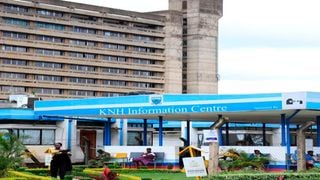
Kenyatta National Hospital in Nairobi. Cancer machines at Kenya's biggest public hospital break down frequently.
| File | Nation Media GroupNews
Premium
Patients agony as KNH cancer machines disabled
What you need to know:
- Many cancer patients prefer Kenyatta National Hospital because it is cheaper.
- Cancer treatment is by policy offered at a subsided rate at the hospital and is an outpatient service.
The main radiotherapy machine at Kenyatta National Hospital has been disabled for a month, leaving thousands of cancer patients without services.
Many cancer patients prefer KNH because it is cheaper, and those who travelled from far away sit on benches waiting for the equipment to be repaired. They are in pain and some are alone.
“I’m just praying that the services are restored as quickly as possible,” said Ms Susan Situma, who is from Bungoma County and whom we found at the hospital.
“I was due for my radiotherapy in December but because I was still looking for money, I decided to travel to Nairobi yesterday. On arrival, I was told that the machine had broken down.”
She is among thousands of cancer patients who are worried that the longer KNH takes to repair the equipment, the more cancer cells will multiply in their bodies.
“I cannot afford treatment in any private hospital - it is too expensive. This is the only hospital I can afford. I am sure this has happened because the machine is overwhelmed,” Ms Situma said.
She said she will not go back home but will wait until the machine is repaired.
KNH is not only the oldest such facility in Kenya but is a taxpayer-funded public, tertiary, referral hospital.
High costs of treatment
Cancer treatment is by policy offered at a subsided rate at the hospital and is an outpatient service.
A single radiotherapy session at KNH costs Sh500 but it costs between Sh5,000 and Sh10,000 at private hospitals.
Most patients undergo many sessions of both radiotherapy and chemotherapy. Most cannot afford the high costs of treatment at private facilities.
Many patients have died in queues in the past while others slept in corridors waiting for treatment that often comes too late.
About 29 per cent of patients in 2019 missed or delayed cancer treatment, the American Cancer Society says. The main barriers to treatment were accommodation while in Nairobi and transport to and from the hospital.
As of March last year, KNH was the only public health centre with radiotherapy machines. But the two machines regularly break down.
Cancer cases outweigh the treatment capacity of KNH’s two machines, which are overstretched and are already fully booked for the whole year, said a nurse who sought anonymity.
“If I tell you that the machines work without stopping and on a daily basis, close to 200 patients on radiotherapy are attended to and about 150 on chemotherapy and close to over 200 new cases received every day, you will not believe it,” the nurse said.
More than 3,000 new cancer patients begin treatment each year at the hospital.
Treatment centre
Once a patient begins radiotherapy treatment, one official said, they must undergo 25 sessions continuously, which are to be administered on weekdays.
“Now tell me, if we are attending to over 200 patients daily and each requires 25 sessions, the machines can never rest because the demand for the services is very high. It must be repaired first,” the official said.
One of the machines at the treatment centre has been in use for the past 30 years and needs frequent repairs.
“I feel for the patients, but I am sure that something is happening and in the next few days, we will be back to our normal operations,” the official said.
Calls to the hospital went unanswered and our emails and text messages had not been answered by publication time.
But an official at KNH confidentially explained the problem is due to the failure by the manufacturer to repair the machine on time.
“The cobalt machine is normally serviced by the manufacturer from India, and there were travel restrictions due to Covid-19 in 2021. Measures are underway to service the cobalt radiotherapy machine,” said the official.





